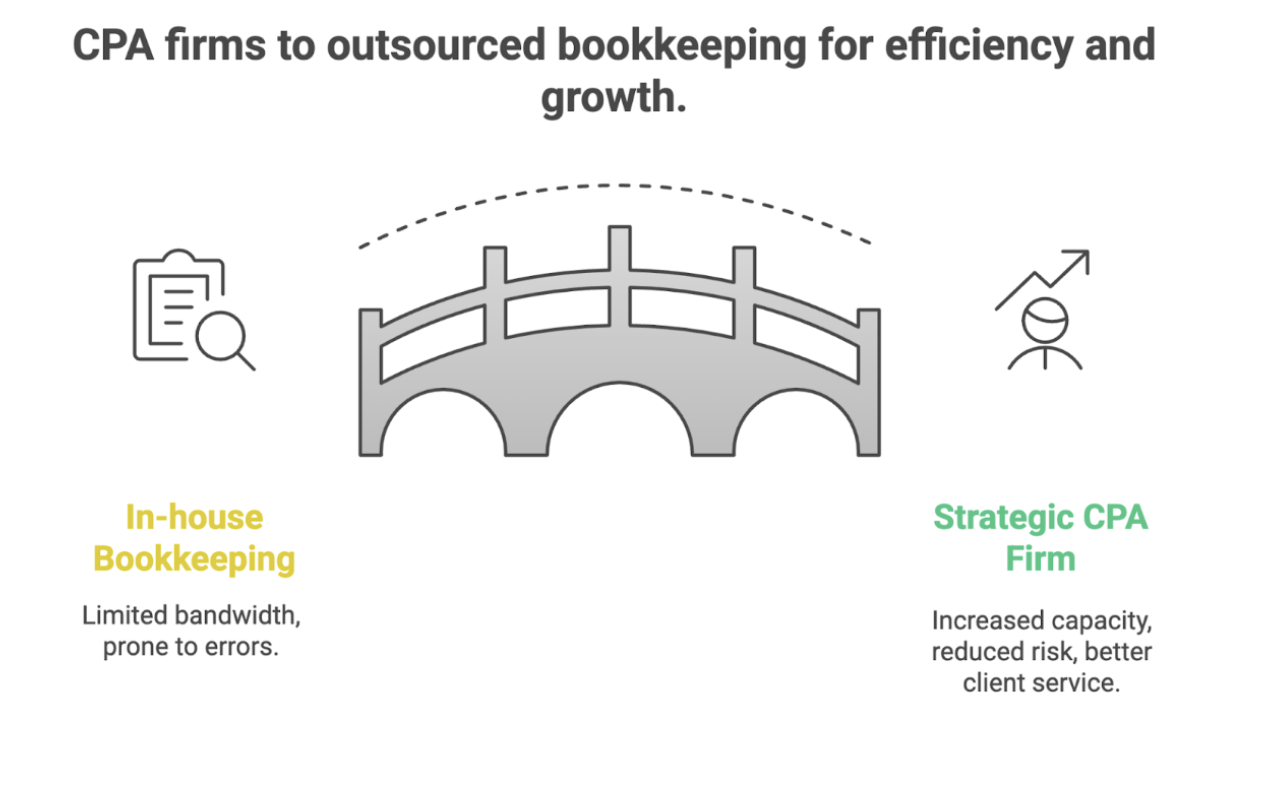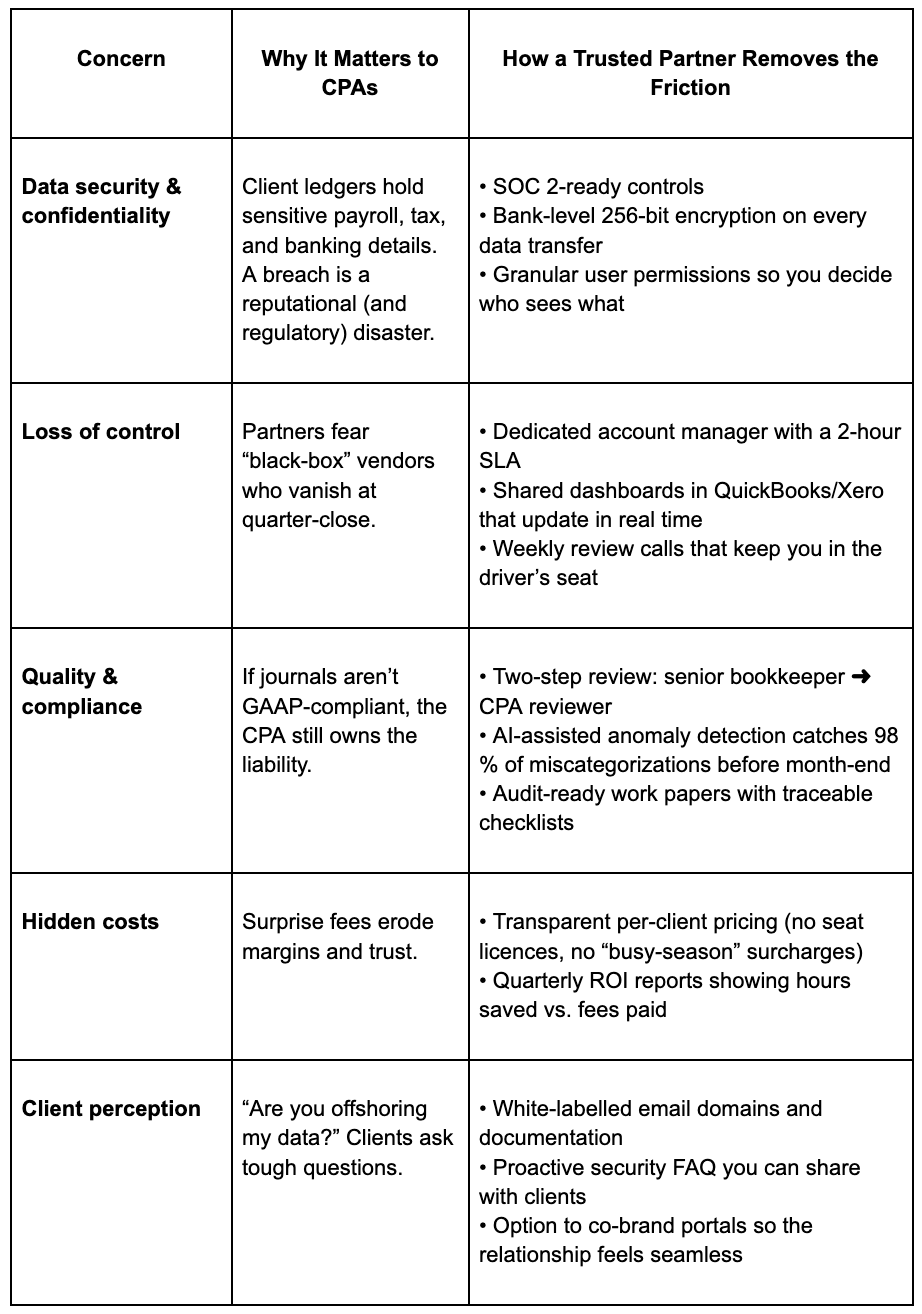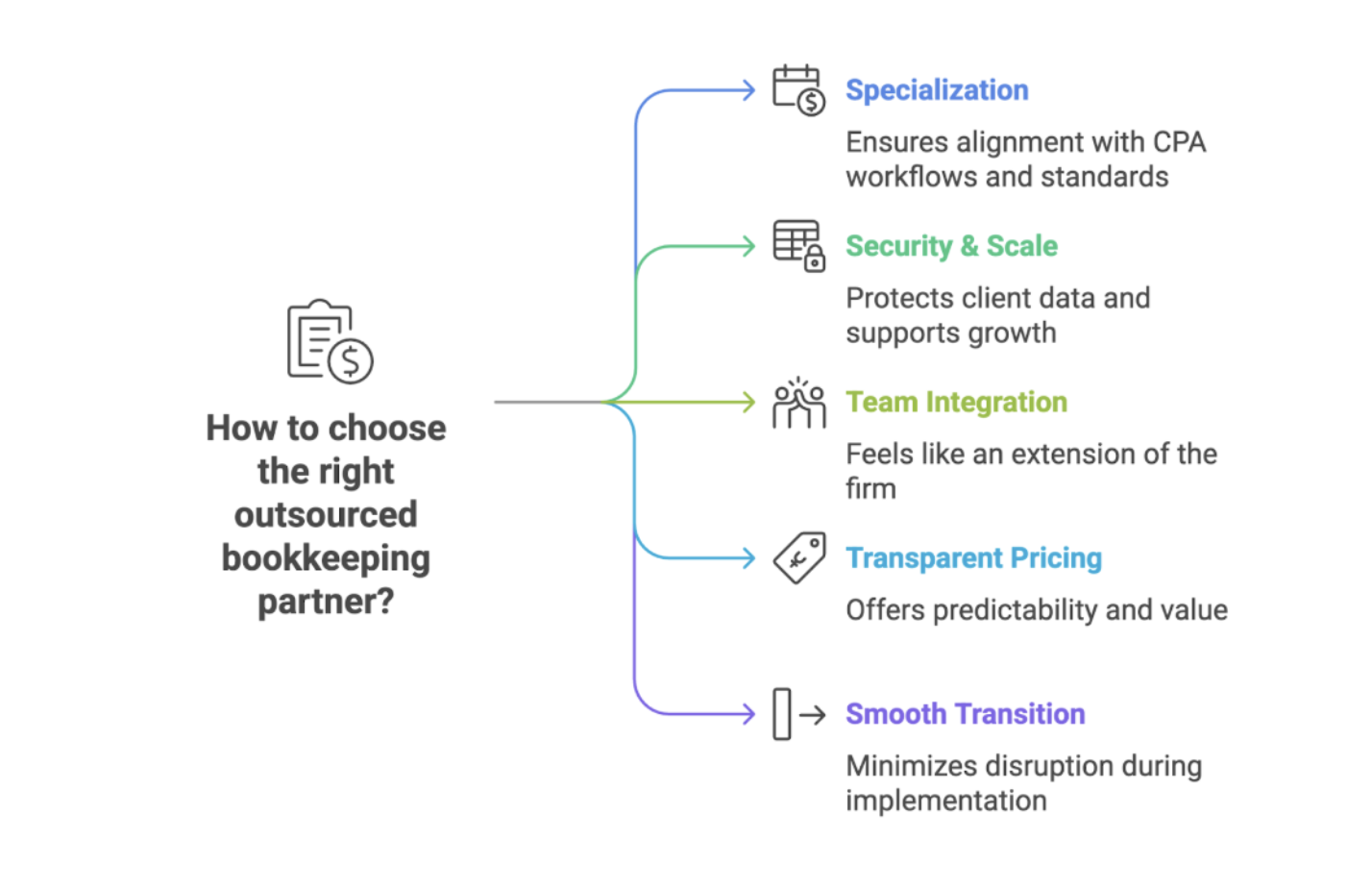Time used to be on your side.
But for most CPA firms today, it's the one thing that's slipping fastest.
With tighter filing deadlines, shifting tax codes, and clients demanding real-time updates, the traditional bookkeeping model is stretched thin. Hiring in-house for bookkeeping and accounting takes time and can be inefficient. Training takes more. And errors? They cost you trust.
That's why outsourced bookkeeping for CPAs is no longer a back-office afterthought; it's a strategic advantage.
By offloading routine, time-intensive tasks to a specialized partner, CPAs can reallocate their bandwidth to higher-value services like advisory, tax planning, and client strategy, without compromising accuracy or control.
In this guide, we'll walk you through:
If you're looking to scale your practice without adding headcount, or just reclaim your time, this one's for you.
Let's get into it.
If you're running a CPA firm, you already know this: bookkeeping and accounting are essential, but they can also be a bottleneck.
It's repetitive. Time-consuming. And it pulls your best people away from the real value drivers: tax preparation, advisory, and client strategy.
Outsourced bookkeeping solves for that. It means handing off the daily grind, transaction entry, bank recs, accounts payable, to a specialist team that lives and breathes clean books. Not freelancers. Not generic vendors. But a partner who integrates directly into your workflows and makes your life easier.
At Madras Accountancy, we do this for CPA firms every day. Here's what this accounting service typically includes:
We're not a black-box vendor. You stay in control. You see every update. You get one point of contact, no rotating support agents, no back-and-forth.
The word "outsourcing" gets a bad rap. For a lot of firms, it brings up images of miscommunication, delays, or subpar work.
But that's not what smart CPA firms are doing.
Today, outsourcing means building a real extension of your team, with better tools, better processes, and round-the-clock coverage. It's not about finding the cheapest provider. It's about finding a partner that lets you grow in a scalable way without burning out your staff or compromising on quality.
And yes, it saves money. But more importantly, it saves time. Your team gets to focus on review and strategy, not reconciliation and data entry, by utilizing accounting outsourcing.
Here's how a typical engagement with Madras Accountancy works:
Most firms come to us when they're drowning in low-margin work and can't hire fast enough. We help them fix that.
No drama. Just clean books, on time.
If you've outgrown DIY bookkeeping or your in-house team is stretched too thin, this is the model that gets you back in control, without adding overhead.
There's a clear shift happening in the accounting world.
In the past, CPA firms kept everything in-house, often out of habit or control, missing out on the benefits of outsourced accounting and finance. But today, as client demands grow and staff bandwidth shrinks, firms are rethinking what really needs to be done internally.
That's where outsourced bookkeeping enters the picture, not as a cost-cutting shortcut, but as a smarter way to deliver accuracy, speed, and scale.
Here's why so many CPAs are making the switch.
Staffing is a growing concern for CPA firms, especially during tax season or audits. Finding experienced bookkeepers is difficult. Retaining them? Even harder.
Outsourcing bypasses that entire bottleneck. You get a trained, process-driven team that can handle routine bookkeeping tasks without needing onboarding, training, or supervision.
With Madras Accountancy, our clients typically reduce internal bookkeeping load by 60–80% within the first month. That time gets reallocated to advisory, tax preparation, or client acquisition, high-margin areas that grow your business.
And when new clients come in? You scale instantly with outsourced accounting and bookkeeping services. No more panic hiring when you have a trusted partner for accounting outsourcing.
Manual bookkeeping is prone to error. One wrong entry can throw off a tax return or damage client trust. When you're juggling multiple accounts and deadlines, that risk multiplies.
Outsourced bookkeeping teams, especially those built for CPA firms, operate with structured checklists, review layers, and version control. They're designed to catch what others miss.
For example, at Madras Accountancy:
It's not just done, it's documented, reviewed, and ready to withstand client or auditor scrutiny.
Let's be honest: bookkeeping, while essential, is low-leverage work for a CPA.
It doesn't drive revenue. It doesn't deepen client relationships in the context of accounting and bookkeeping services. And when your team spends hours sorting expenses or chasing receipts, you lose opportunities to sell strategic services.
Outsourcing repositions your team as reviewers, not processors. That shift allows you to:
And you don't need to build a larger team to do it.
Yes, outsourced bookkeeping is often cheaper than in-house. Especially when you factor in salaries, benefits, training, and rework costs associated with in-house bookkeeping and accounting.
But the real win is profit margin expansion.
Here's how it plays out:
For firms that run on tight margins or project-based billing, this makes a major difference to bottom-line health.
The best outsourced bookkeeping providers don't just offer services, they build systems. That's especially true for firms like Madras Accountancy, where we:
You don't get a rotating team. You get a consistent relationship with people who understand CPA timelines, tools, and pressure points.
In other words: no retraining, no hand-holding, no worrying about what's being missed.
Outsourced bookkeeping isn't about doing the same work for less. It's about rethinking who should be doing what, and why.
When CPAs offload the bookkeeping layer to a trusted partner, they unlock capacity, reduce risk, and serve their clients better.
And in 2025, where firms are competing on speed, insight, and responsiveness, not just price, that's a competitive edge you can't afford to ignore.

Even the most forward-thinking firms hesitate before handing off their books. These are the five objections we hear most often, and how an experienced partner like Madras Accountancy resolves them.

The fear: Handing over client books feels like giving up oversight.
The reality: Good outsourced providers enhance your control, not diminish it.
How we solve it:
You're not losing control, you're gaining visibility without the grunt work.
The fear: Outsourced work will be sloppy or inconsistent.
The reality: Professional outsourced teams often deliver higher consistency than overwhelmed in-house staff.
How we solve it:
Quality isn't just maintained, it's measurably improved.
The fear: Sensitive financial information could be compromised.
The reality: Professional providers invest more in security than most small firms can afford.
How we solve it:
Your clients' data is often more secure with us than on local servers.
The fear: Clients will be upset about outsourcing their books.
The reality: Most clients care about results, not location.
How we solve it:
When books are cleaner and faster, clients are happier.
The fear: Outsourcing creates more work, not less.
The reality: The right partner requires minimal management after initial setup.
How we solve it:
Most clients find they spend less time managing the outsourced relationship than they did managing internal bookkeeping staff.
Pro tip: Put your vendor's SOC 2 report and workflow diagram right into your client pitch deck. It answers 80% of security questions before they're asked.
The wrong bookkeeping partner creates more problems than it solves.
Missed reconciliations. Unanswered emails. Clients are chasing you for updates you were expecting from them.
For CPA firms, outsourcing isn't about delegating work; it's about choosing the right operational partner. And that decision has to be based on more than just cost.
Here's how top firms evaluate their options, and why providers like Madras Accountancy are winning trust in the CPA space.
Not every bookkeeping provider understands the pace, pressure, and structure of a CPA firm. You need a partner who's comfortable living inside tax calendars, audit prep cycles, and client cleanup work.
Madras doesn't serve "everyone", they work exclusively with accounting firms. That means:
If your current provider keeps asking how to code a tax deposit, they're not built for this.
Outsourcing without transparency is dangerous, especially when client data is involved.
Look for providers that:
Madras Accountancy checks every box:
They even offer co-branded reports and private-labeled email support, so your firm's professionalism stays intact, front and center.
The best outsourced teams don't feel outsourced. They feel embedded.
You shouldn't need to "project manage" your own bookkeeping and accounting services. Look for:
At Madras, every firm gets:
It's not "one-size-fits-all." They walk you through the process once, and then run it without a hitch.
Cheap bookkeeping is expensive when it costs you time.
What matters more than hourly rates? Predictability. Transparency. And pricing that reflects your actual scope and scale.
Madras offers:
You're not guessing what you're paying for. You're seeing it in reports.
The reason firms delay outsourcing? They fear the transition.
And they should, if the provider doesn't have a process.
Madras starts with:
Within a month, the work's off your plate, and the output's better than before.
Madras Accountancy isn't a generalist firm trying to "do bookkeeping."
We are built from the ground up for CPA firms who want to grow without adding headcount.
Want to see how it would work for your firm?
Schedule a free consultation with Madras Accountancy, no sales pressure, just clarity.

While budget considerations are important, the benefits of outsourced bookkeeping extend far beyond simple cost reduction. CPA firms that partner with quality providers see improvements across multiple dimensions:
Professional outsourced teams bring specialized expertise in financial reporting standards and best practices. This results in:
For small businesses and growing CPA firms, scalability is crucial. Outsourced bookkeeping provides:
Many outsourced providers invest heavily in accounting software and technology platforms that individual firms might find cost-prohibitive:
By outsourcing routine bookkeeping tasks, CPA firms can redirect their resources toward:
Many CPA firms serve small businesses that have unique accounting needs and constraints. Outsourced bookkeeping can be particularly beneficial when serving this market segment:
Small business clients often need consistent, reliable bookkeeping processes. An experienced accountant working through an outsourced provider can deliver:
Small businesses are typically budget-conscious. Outsourced bookkeeping allows CPA firms to:
Many small business clients use cloud-based accounting software. Outsourced providers are typically well-versed in:
Bookkeeping doesn't have to be a time sink. And scaling your firm shouldn't mean stretching your team thinner every tax season.
For CPA firms, outsourcing isn't about giving up control; it's about getting the right support, with the right systems, so your internal team can focus on higher-value work.
When done well, outsourced accounting services:
But it only works if the partner understands CPA workflows, respects your brand, and delivers consistently.
That's where firms like Madras Accountancy come in. They don't just handle the work; they build capacity into your practice in a scalable way that fits your budget.
Whether you're preparing a single tax return or managing complex financial reporting for multiple clients, having the right outsourced support can transform your practice from reactive to proactive, from overwhelmed to optimized.
Curious if outsourcing makes sense for your firm?
Visit Madras Accountancy to explore how they support CPA firms like yours, quietly, securely, and efficiently.

A practical comparison of hiring a freelancer vs using a dedicated offshore accounting team, focusing on continuity, quality control, security, and scaling.

How CPA firms outsource payroll and 1099 work to reduce penalties and admin load, with a clean workflow for approvals, filings, and year-end reporting.

Practical do's and don'ts for CPA firms outsourcing accounting work, based on common failure points and what successful rollouts do differently.